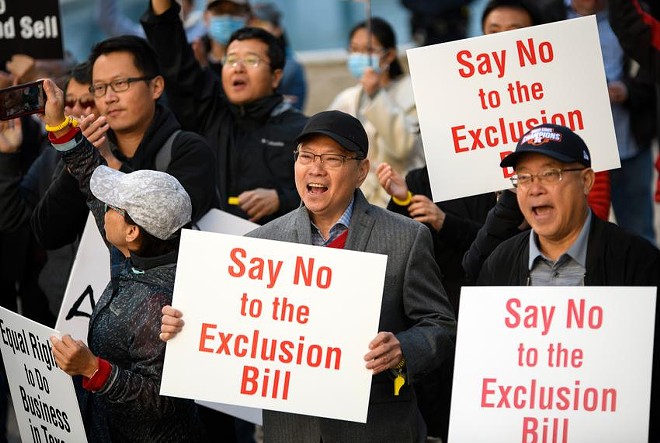
Senate Bill 147, sent to the Texas House on a 19-12 vote, restricts purchases of agricultural land, timberland and oil and gas rights by entities associated with any country that “poses a risk to the national security of the United States” — as designated by three consecutive annual threat assessment analyses by the Office of the Director of National Intelligence.
The legislation also allows the Texas attorney general’s office to investigate potential violations and refer cases to courts for divestment proceedings if a “reasonable suspicion” arises that the buyer is associated with one of the designated countries.
The bill passed Wednesday was a significantly watered-down version of an earlier proposal that sought an outright ban on land sales to dual citizens and businesses associated with China, Iran, North Korea and Russia. SB 147 was softened after months of outcry from Asian American groups and others who said it would make it impossible for dual citizens and other immigrants to buy homes or start businesses.
Sen. John Whitmire, D-Houston, thanked Sen. Lois Kolkhorst, R-Brenham, for narrowing her bill but said he could not support an effort that has encouraged racists and jeopardized the safety of Asians in Texas.
“Just the rhetoric surrounding this legislation is putting them in jeopardy from racists, [from] bias. They’re being targeted as we talk,” Whitmire said.
“We can’t continue to single out ethnic groups and communities,” he said, adding that if it had been later in the session, he would “talk this bill to death” with a filibuster. “I feel that strongly.”
Kolkhorst said her bill was a measured response to a real security threat that other states have also moved to address.
“Senate Bill 147 is just about maintaining a strong Texas. It is not in any way picking out someone of a certain origin,” she said.
Prior to the Senate's first vote on the bill Tuesday, Kolkhorst put forward several amendments that she said were aimed at those concerns while protecting national security, including new language that limits the restrictions to specific types of land and applies to purchases, not leases.
“This ensures that we strengthen our food security, our energy security and our national security,” Kolkhorst said after roughly two hours of debate. “... You can come and buy your company. You can have your restaurant.”
Asian Americans reacted to the bill's passage with dismay Wednesday, saying it could further anti-Asian sentiment that has skyrocketed in recent years. As with other iterations of the legislation, they said it unfairly associated American citizens with their countries of origin and with governments they may have fled.
“National security is a serious issue, but if we are concerned about the actions of foreign governments, then legislation should only affect foreign governments and their agents,” said Rep. Gene Wu, a Houston Democrat who immigrated to the United States from China as a child and has been outspoken against SB 147. “Labeling every person from a nation as an agent of that government is not only unjust, but is also counterintuitive given the number of asylum seekers and refugees that our nation welcomes from those same countries.”
In a statement, the civic group United Chinese Americans said it was “extremely disappointed” by the bill's passage.
“Less discrimination is still discrimination,” the group said. “The Asian American community will unite and stand strong together for equal protection and fair treatment.”
Kolkhorst has said SB 147 builds on legislation from 2021, when state lawmakers unanimously voted to ban Texas businesses and government officials from making infrastructure deals with interests from the four countries. That legislation was filed in response to a Xinjiang-based real estate tycoon’s purchase of roughly 140,000 acres for a wind farm in Del Rio, a small border town near Laughlin Air Force Base.
According to the U.S. Department of Agriculture, Chinese investors own less than 1% of total foreign-held acreage in the United States. Investors from Russia, Iran and North Korea collectively own less than 3,000 acres.
Tuesday’s amendments marked the second time Kolkhorst has softened the bill’s language. In March, she clarified that the proposal would not apply to dual citizens or houses that were homesteaded and accepted substitute language that would have required potential homebuyers to disclose their affiliations with such countries within 10 days of initiating purchase agreements.
Those changes, which have since been dropped, did little to assuage concerns among opponents, who said it would increase discrimination by associating all Asian Americans — one of the state’s fastest-growing population segments — with the Chinese government. Moreover, they said, the bill’s enhanced oversight provisions could dissuade home sellers from engaging with potential Asian American buyers because of concerns that they are associated with China — and a sale would thus be subject to legal scrutiny.
Despite the objections, earlier versions of Kolkhorst’s bill drew support from top Texas GOP figures, including Agriculture Commissioner Sid Miller and Gov. Greg Abbott, who said he would sign the bill.Coming soon: SA Current Daily newsletter. We’ll send you a handful of interesting San Antonio stories every morning. Subscribe now to not miss a thing.
Follow us: Google News | NewsBreak | Instagram | Facebook | Twitter

















